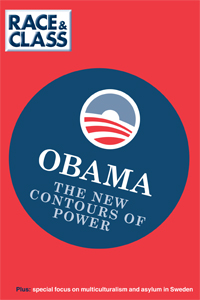Description
The July 2007 edition of the journal Race & Class leads with Jerry Harris’ new analysis of the revolutionary movements in Bolivia and Venezuela, features Amrit Wilson’s examination of the forced marriage debate in Britain and includes studies of indigenous knowledge, the Pan Africanist T E S Scholes and the plight of prisoners in Hurricane Katrina.
Bolivia and Venezuela: the democratic dialectic in new revolutionary movements
The beginning of the twenty-first century has witnessed the rise of exciting new revolutionary movements against capitalist globalisation. They are characterised, in Latin America particularly, by qualitatively different strategies from the socialist movements of the last century. Jerry Harris suggests that these movements are best viewed from the standpoint of a democratic dialectic linking together the roles of the state, the market and civil society.
The forced marriage debate and the British state
In recent years, the British government has increasingly sought to intervene to prevent forced marriages and ‘honour killings’. But its new-found concern for the plight of South Asian women belies a deeper structure of racism, particularly against Muslims, and collusion with South Asian patriarchy. Amrit Wilson argues that initiatives such as the recent proposal for legislation on forced marriages are not empowering to women but are driven by the state’s need to police South Asian communities, an approach that has colonial roots.
Indigenous knowledge and western science: the possibility of dialogue
In recent years, a number of scientific bodies and development agencies have called for indigenous and traditional systems of knowledge to be recognised as valuable reservoirs of learning – a move inspired, in part, by the prospect of multinational biotechnology corporations exploiting traditional non-western medical, agricultural and ecological knowledge. But recognising the legitimacy of indigenous knowledge, albeit partially, has profound implications for conceptions of science, argue Arun Bala and George Gheverghese Joseph.
T E S Scholes: the unknown Pan Africanist
In the roll call of the Pan African movement, the name of Theophilus Scholes is virtually unknown. Kim Blake describes how this one-time Baptist missionary, who was born in Jamaica and served briefly in the Congo and on the Gold Coast, became a trenchant and influential critic of late nineteenth-century British imperialism.
Abandoned and abused: Orleans parish prisoners in the wake of Hurricane Katrina
During Hurricane Katrina, thousands of men, women and children were abandoned in the New Orleans jail. As the floodwaters rose, prisoners were trapped for days in locked cells without food, some standing in sewage-tainted water up to their chests, while guards left their posts. The fate of these predominantly poor and African-American prisoners, mostly pre-trial detainees held on minor charges, is documented by the National Prison Project of the American Civil Liberties Union.
Detained: foreign children in Europe
The EU’s target-driven and draconian deportation policy towards asylum seekers and undocumented migrant workers has a shocking but little heeded impact on minors, whether the children of asylum-seeking families, separated/unaccompanied minors seeking refuge or the children of sans papiers. The harm done to them, as documented by Liz Fekete, is incalculable.
Race & Class is published quarterly, in January, April, July and October, by Sage Publications for the Institute of Race Relations; individual subscriptions are £27/$47, for four issues, with an introductory rate of £20/$35 for new subscribers.


